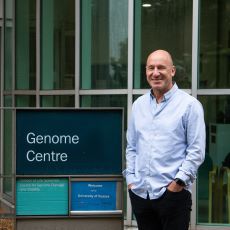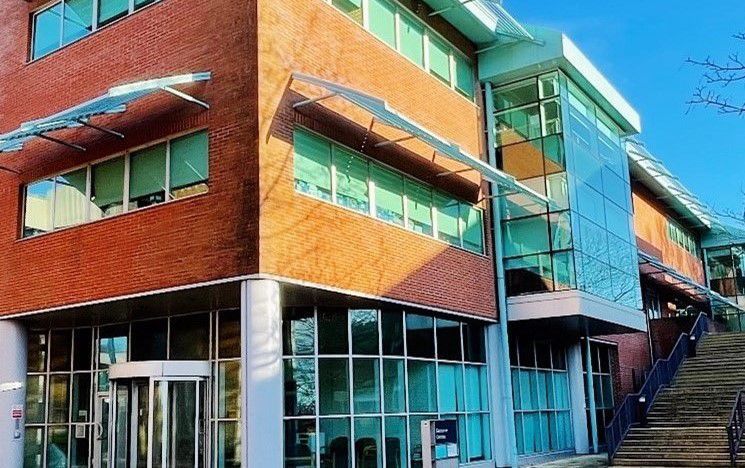About us
The Genome Damage and Stability Centre (GDSC) is a world-leading research Centre of Excellence focused on understanding how our genomes are propagated, repaired and maintained and how defects in these processes cause human disease.
Our building and our research
The mission of the Genome Damage and Stability Centre (GDSC) is to understand how the DNA in our genomes is repaired and maintained. We investigate how DNA damage causes cancer and neurodegeneration, and we help clinicians worldwide diagnose, manage, and treat these diseases.
Learn more about the GDSC senior management team structure [PDF 127.66KB].
Learn more about what we do
- Our research interests
We investigate the responses of cells to genome damage and the diseases that this damage can cause, such as cancer and neurodegeneration.
The GDSC is recognised internationally for our pioneering work in the field of genome instability and genetic disease, and is a dynamic and collaborative environment for state-of-the-art molecular, genetic, and biological research.
As a result of our international expertise, the GDSC works closely with clinicians and families worldwide to uncover the molecular causes of rare hereditary diseases in which genome stability is perturbed.
More than 90% of the societal impact and published output from our biological research was assessed as 3* or 4* in the last Research Excellence Framework (REF 2021).
Our genomes
Our genomes are made up of long molecules of DNA that contain the genetic blueprint that tells every part of the body how to work. However, our DNA is attacked and damaged by harmful radiation and toxins present in our environment, e.g. ultraviolet light from the sun and chemicals present in cigarettes and industrial pollutants. Importantly, our DNA is also under constant attack by endogenous genotoxins produced by our own cells, e.g. as a result of the use of oxygen for cellular metabolism.
However, our cells contain sophisticated mechanisms for repairing DNA damage and protecting our genomes. These protective processes are the focus of our research, which we conduct using a range of cutting-edge molecular, genetic and cellular tools, including cells donated from people with genetic disorders in which DNA repair systems are faulty. Faulty DNA repair systems can result in very high incidences of cancer (more than 1,000 times higher than in the general population) and in neurodevelopmental or neurodegenerative disease.
By identifying the genes and processes that repair damaged DNA, we are able to help clinicians diagnose and manage rare genetic disorders in which our genomes are unstable and to gain insights to how cancer and neurological diseases arise and develop.
- Our research approaches
Our research groups focus on different aspects of DNA damage responses and genome instability. Our main research approaches include:
Human Cell Biology and Molecular Genetics
Keith Caldecott, Chris Chan, Helfrid Hochegger, Timothy Humphrey, Penny Jeggo, Alan Lehmann, Mark O'Driscoll, Ulrich Rass and Evi Soutoglou are molecular and cell biologists studying DNA repair processes, cell cycle control and the replication of damaged DNA in human, and other vertebrate cells. They have identified new human DNA repair genes and have discovered deficiencies in DNA repair and DNA damage processing in several human genetic disorders. In addition, they are uncovering the molecular pathways that maintain the integrity and stability of the human genome.
Yeast Molecular Genetics
Jon Baxter, Alessandro Bianchi , Tony Carr, Timothy Humphrey, Matt Neale and Ulrich Rass use fission yeast (Schizosaccharomyces pombe ) and/or budding yeast (Saccharomyces cerevisiae) as model systems to understand how the genome is protected against the pathological impact of DNA damage during DNA replication and by processes such as DNA repair, cell cycle checkpoint control, and chromatin remodelling. These groups are also interested in fundamental aspects of genome biology such as DNA double-strand break formation during meiosis and the role of chromosome ends (telomeres) in the preservation of genome stability.
Biochemical and Structural Interrogation of Multiprotein Systems
Aidan Doherty, Jasmeen Oberoi, Antony Oliver, Laurence Pearl and Luke Yates are biochemists and structural biologists studying the assembly, specificity and regulation of multi-protein complexes involved in the recognition, repair and signalling of DNA damage. They are also involved in the discovery and development of novel small-molecule inhibitors with application as drugs for the treatment of cancer and other diseases.
Diagnoses of Genetic Disorders
Caldecott, Jeggo, Lehmann and O’Driscoll are investigating the relationship between the molecular defects and clinical features of human genetic disorders caused by faulty cellular responses to DNA damage. These groups have developed cellular tests for these disorders and work closely with clinicians and families across the world to uncover the molecular defects that cause these disorders, aiding clinicians in their diagnosis and clinical management.
- Our funding and who we work with
Our funding is awarded competitively from a number of prestigious national and international sources, including the UK government (Research Councils UK), Europe (European Research Council), and both national and international charities (e.g. Cancer Research UK, The Royal Society, and the Wellcome Trust.
Typically, we have more than £20m in currently active research funding and we have been awarded more than £100m research funding in total.
We work with other research groups in the School of Life Sciences and wider University including Neuroscience, Drug Discovery, Biochemistry and Biomedicine, and the Brighton and Sussex Medical School. We also work with scientists at other universities and research institutes nationally and across the world.
- Our outputs and discoveries
Since opening, we have:
- published more than 800 scientific papers
- identified new human DNA repair genes and their functions (e.g. XPV, ATR, KU80, TDP2, PRIMPOL)
- identified new human genetic diseases caused by defects in these genes (e.g. Xeroderma pigmentosum, Cockayne syndrome, LIG4 syndrome, SCAR23, SCAR26, Seckel syndrome, SMC5/6 chromosome breakage syndrome)
- aided clinicians and families worldwide in the diagnosis, management and treatment of these human diseases, e.g. as the ‘gene hunters’ giving hope to people with very rare diseases and also to those family members who support them.

Professor Keith Caldecott FMedSci FRS
Director of the Genome Damage and Stability Centre
History of the Centre
The GDSC began as the UK’s Medical Research Council (MRC) Cell Mutation Unit and was (re)opened as a new MRC Research Centre in 2002, by Sir Paul Nurse.
In 2012, the GDSC was embedded as a University Research Centre, and subsequently designated a University Centre of Excellence.
Crossing over
The bronze sculpture pictured below was created and provided by Dr Robin Holliday in 2001 and is based on a symbolic representation of the “Holliday junction” in which two DNA molecules recombine. The Holliday junction is central to life and is a key intermediate by which genetic diversity is created.
The sculpture is on permanent display in the reception area of the GDSC.

Contact
Genome Damage and Stability Centre
Science Park Road
University of Sussex
Falmer, Brighton
East Sussex BN1 9RQ
+44 (0)1273 678123
